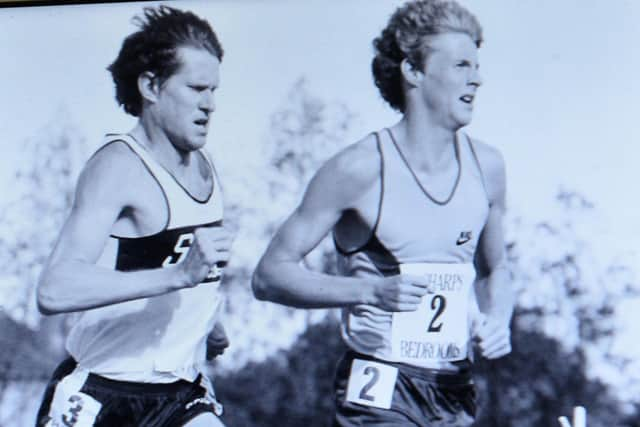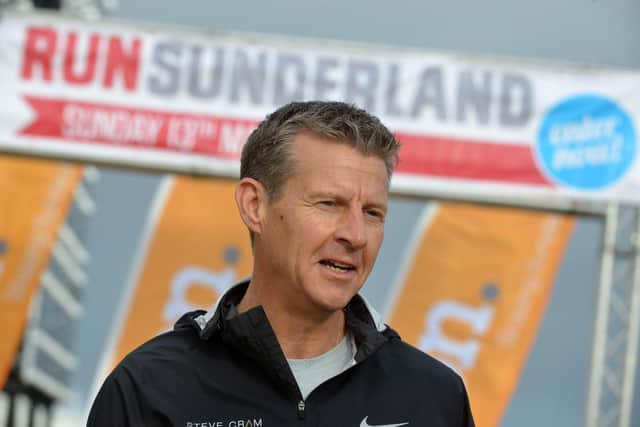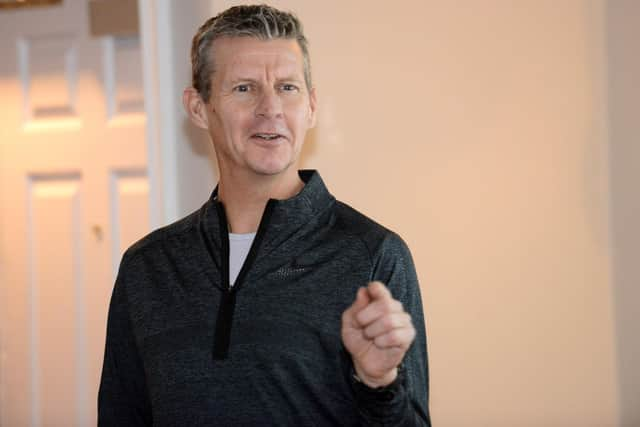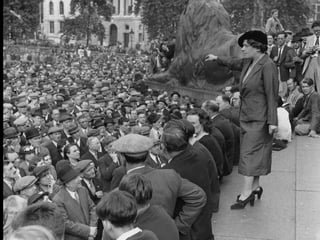Steve Cram is 60: looking back on the incredible athletics career of a Sunderland ambassador
and live on Freeview channel 276
The surprise for younger folk might be discovering just how much more there is to him than his skills as a commentator; or as Chancellor of the University of Sunderland. During the 1980s British middle distance running was at it’s peak with Cram, arguably, the best of the lot.
So awash was Britain with running talent then, names such as Tom McKean and Peter Elliott have been largely forgotten; and they were world class athletes.
Early days


Advertisement
Hide AdAdvertisement
Hide AdStephen Cram was born in Gateshead on October 14, 1960. His dad Bill met his German mother Mia in the 1950s when Bill was stationed in Germany as an RAF policeman.
Young Steve’s obvious talents caught the attention of legendary coach Jimmy Hedley. Cram always acknowledges the role Hedley and the Jarrow & Hebburn Athletics Club would play in his career.
Becoming known as the “Jarrow Arrow” he first hit the big time, or at least its outskirts, at the Moscow Olympics in 1980. The 1500m final, as far as the media was concerned, was all about Steve Ovett and Sebastian Coe.
Coe won, avenging Ovett’s victory in the 800m, while 19 year-old Steve, the slowest qualifier, finished eighth - of nine. But the experience was invaluable and he was catching up.


Advertisement
Hide AdAdvertisement
Hide AdIn 1981 Ovett and Coe remained in the limelight, seemingly breaking world records with ease (although avoiding each other in direct competition), while Cram’s progress was undeniable, but lower profile.
However, in 1982 he came to the fore. Both Ovett and Coe were missing at the European Championships in Athens, then again at the Commonwealth Games in Brisbane. Cram took full advantage and a 1500m gold medal at each event.
Reaching the top
The following year was even better. At the inaugural World Athletics Championships in Helsinki in 1983, Cram took the most important gold medal of the six he would win in major championships. Ovett was back in fourth place and the balance of power was shifting.


This led to Cram being named as BBC Sports Personality of the Year for 1983. He was now a household name.
Advertisement
Hide AdAdvertisement
Hide AdThe early to mid-1980s was perhaps the greatest period in British athletics history. It featured Daley Thompson, Tessa Sanderson, Fatima Whitbread, Alan Wells and the emerging Linford Christie.
In television terms athletics was a bigger deal in those days and not just the Olympics. Huge audiences would watch European meetings in Oslo, Nice, Zurich – and Gateshead.
Perhaps the biggest show of British power on the track came in the men’s 1500m final at the 1984 Los Angeles Olympics, in which the nation was represented by Cram, Ovett and Coe; respectively the world champion, world record holder and Olympic champion.


Ovett was clearly unwell and failed to complete the race. But Cram’s season had also been blighted by injury and he wasn’t quite at his peak. Coe became the only man to win two Olympic 1500m gold medals. He still is. Cram had to settle for silver.
World records
Advertisement
Hide AdAdvertisement
Hide AdFor all his glories, before 16 July 1985 he hadn’t held a world record. Nineteen days later he had set three.
First he ran 3:29:67 in the 1500m in Nice, thereby becoming the first athlete to crack three minutes and 30 seconds. This was a near-mythical landmark in the sport; much as the four-minute mile had been.
He would only hold the record for 38 days. But, as John Landy could testify (look him up), those who do things second tend to be less well remembered.
The world mile record was also set by Cram; in Oslo on July 27. This one stood for eight years and is still the British record. Both records were set in genuine races against fellow top athletes too, and not with the assistance of “pacemakers”.
Advertisement
Hide AdAdvertisement
Hide AdOn August 4 he broke the 2000m world record in Budapest. All three records were broken in a Jarrow & Hebburn vest.
Saïd Aouita
Cram’s biggest track rival was probably the Moroccan Saïd Aouita. He was nothing like Cram either physically or personally.
Cram was accommodating and laid-back. Aouita was rather prickly and sometimes arrogant. However, he was undoubtedly a sublime athlete and a 5000m gold medallist at the 1984 Olympics.
Aouita later claimed that he would have won the 1500m had he only bothered to enter. This seems unlikely. Cram beat Aouita when it really mattered; at the 1983 World Championships and, by a whisker, when he broke the world record in Nice in 1985.
Final glories
Advertisement
Hide AdAdvertisement
Hide AdCram’s last great year on the track was 1986. He successfully defended his European and Commonwealth 1500m titles. He even took gold in the Commonwealth 800m setting a games record which still stands, even though it was never his best event.
From thereon his powers dwindled. He finished fourth in the 1500m at the Seoul Olympics in 1988. He was still a class athlete, but his best was behind him. He finally retired in 1994.
Legacy
Steve Cram was tall, elegant runner with a huge stride. He lacked the “kick” over the final 100m that Ovett and Coe possessed, and so would run the sprint finish out of his rivals by starting his run home with a lap or so remaining.
Everyone knew he would do this, but few were good enough to do anything about it.
Advertisement
Hide AdAdvertisement
Hide AdAs a miler he achieved almost everything possible. But not quite. Being slightly short of his magnificent best on August 11, 1984 meant silver was the best he ever managed at the Olympics.
Frustrating. But in what was by far Britain’s greatest era in middle distance running, the Jarrow Arrow was perhaps the greatest of them all.
His contribution to the North East will not be forgotten any time soon. Nor is it over for the now-broadcaster and Sunderland AFC fanatic.
